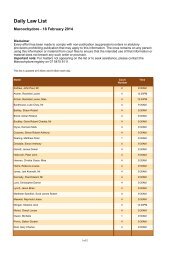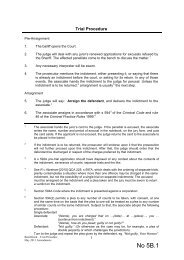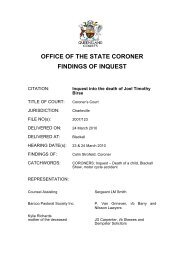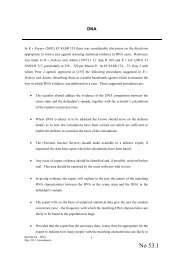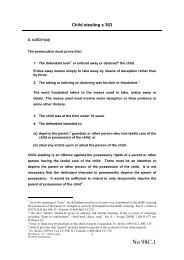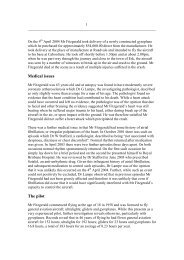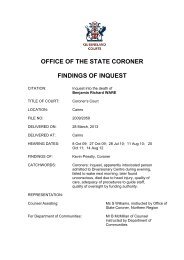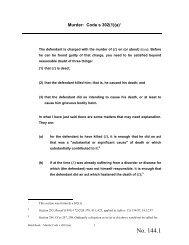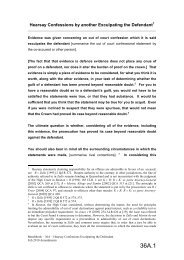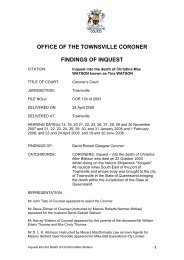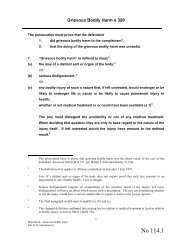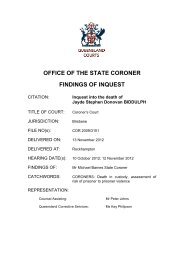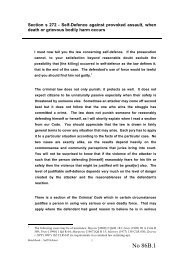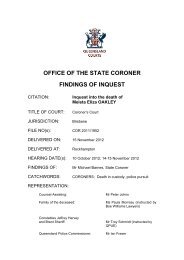Inquest findings - Rosly Amelia Law - Queensland Courts
Inquest findings - Rosly Amelia Law - Queensland Courts
Inquest findings - Rosly Amelia Law - Queensland Courts
You also want an ePaper? Increase the reach of your titles
YUMPU automatically turns print PDFs into web optimized ePapers that Google loves.
Introduction<br />
1. On 21 July 2010, <strong>Rosly</strong>n <strong>Amelia</strong> <strong>Law</strong> was a front seat passenger in a<br />
sedan being driven by her de facto partner, Francis Ronald Maddigan.<br />
Her young daughter was in the rear driver-side of the vehicle. They were<br />
travelling along a rural road outside of Dalby at approximately 6:45pm<br />
when Mr Maddigan suddenly came upon a herd of cattle that had escaped<br />
from a nearby property. He was unable to avoid a collision with two of the<br />
cattle and as a result lost control of his vehicle that then collided with the<br />
rear end of a truck parked on the side of the road nearby. Other local<br />
residents travelling along the same road earlier had come across the herd<br />
of cattle and had stopped with the intention of moving them off the road.<br />
2. <strong>Rosly</strong>n suffered fatal head injuries and despite treatment died in Brisbane<br />
at the Princess Alexandra Hospital.<br />
3. The issues for the inquest were:<br />
(a) The matters required by section 45(2) Coroners Act 2003,<br />
namely who the deceased person was, how they died, when<br />
they died and what caused them to die;<br />
(b) The involvement of cattle that had strayed onto the highway<br />
in the cause of death of the deceased, including a<br />
consideration of whether the coroner may comment<br />
(pursuant to section 46 Coroners Act 2003) on wider<br />
circumstances such as ways to prevent similar deaths in<br />
future; and<br />
(c) The question of whether the driver of the vehicle the<br />
deceased was travelling in ought to be referred to the<br />
Director of Public Prosecutions or other agency pursuant to<br />
section 48 Coroners Act 2003<br />
The scope of the Coroner’s inquiry and <strong>findings</strong><br />
4. There has been considerable litigation concerning the extent of a<br />
coroner’s jurisdiction to inquire into the circumstances of a death. The<br />
authorities clearly establish that the scope of an inquest goes beyond<br />
merely establishing the medical cause of death.<br />
5. An inquest is not a trial between opposing parties but an inquiry into the<br />
death. In a leading English case it was described in this way:- “It is an<br />
inquisitorial process, a process of investigation quite unlike a criminal<br />
trial where the prosecutor accuses and the accused defends… The<br />
function of an inquest is to seek out and record as many of the facts<br />
concerning the death as the public interest requires.” 1<br />
6. The focus is on discovering what happened, not on ascribing guilt,<br />
attributing blame or apportioning liability. The purpose is to inform the<br />
1 R v South London Coroner; ex parte Thompson (1982) 126 S.J. 625<br />
Findings of the inquest into the death of <strong>Rosly</strong>n <strong>Amelia</strong> <strong>Law</strong> 1



